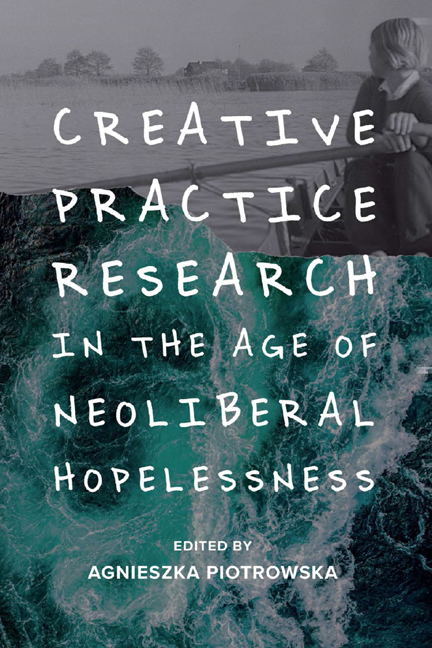Book contents
- Frontmatter
- Contents
- List of Figures
- Notes on Contributors
- Acknowledgements
- Preface: Life in the Post Pandemic Age
- Dedication
- 1 Introduction: Complexities, Compromises and Complicities
- 2 Against the Grain: Women Film Practitioners and Theorists Talk Creative Practice and Theory
- 3 Married to the Eiffel Tower: Notes on Love, Loss and Knowledge
- 4 Creativity and Neoliberalism: Between Autonomy, Resistance and Tactical Compliance
- 5 Tactical Compliance and the Persistence of Elsaesser
- 6 Storytelling and Game Playing
- 7 Autonomy and the Other Woman: Queer Active Agency and Postcolonial Expectations
- 8 From Neolithic to Neoliberal
- 9 First-person Expression on ‘Non-Western’ Screens: China as a Case Study
- 10 Scholarly Exploration of the Creative Process: Integrating Film Theory and Practice
- 11 Teaching Practice as Theory: Guerrilla Filmmaking
- 12 Baits of Falsehood: The Role of Fiction in Documentary or From Untheorised Practice to Unpractised Theory
- 13 Repented: A Creative Intersemiotic Translation
- Notes on Repented
- 14 How do you see me? The Camera as Transitional Object in Diasporic, Domestic Ethnography
- 15 ‘Shut Your Hole, Girlie. Mine's Making Money, Doll’: Creative Practice-Research and the Problem of Professionalism
- 16 Feminist ‘Pensive-creative Praxis’ and Irigaray: A Porous, Dialogical Encounter
- 17 The Paths of Creation, or How Can I Help my Dybbouk to Get Out of Me?
- 18 ‘We Want to Kill Boko Haram’: Reflections on the Photographic Representation of Children in a Displacement Camp
- 19 Between ‘Counter-movement’ (Ingold) and ‘Living with Ghosts’ (Demos)
- 20 Screen Memories: A Video Essay on Smultronstället/Wild Strawberries
- Index
8 - From Neolithic to Neoliberal
Published online by Cambridge University Press: 17 October 2020
- Frontmatter
- Contents
- List of Figures
- Notes on Contributors
- Acknowledgements
- Preface: Life in the Post Pandemic Age
- Dedication
- 1 Introduction: Complexities, Compromises and Complicities
- 2 Against the Grain: Women Film Practitioners and Theorists Talk Creative Practice and Theory
- 3 Married to the Eiffel Tower: Notes on Love, Loss and Knowledge
- 4 Creativity and Neoliberalism: Between Autonomy, Resistance and Tactical Compliance
- 5 Tactical Compliance and the Persistence of Elsaesser
- 6 Storytelling and Game Playing
- 7 Autonomy and the Other Woman: Queer Active Agency and Postcolonial Expectations
- 8 From Neolithic to Neoliberal
- 9 First-person Expression on ‘Non-Western’ Screens: China as a Case Study
- 10 Scholarly Exploration of the Creative Process: Integrating Film Theory and Practice
- 11 Teaching Practice as Theory: Guerrilla Filmmaking
- 12 Baits of Falsehood: The Role of Fiction in Documentary or From Untheorised Practice to Unpractised Theory
- 13 Repented: A Creative Intersemiotic Translation
- Notes on Repented
- 14 How do you see me? The Camera as Transitional Object in Diasporic, Domestic Ethnography
- 15 ‘Shut Your Hole, Girlie. Mine's Making Money, Doll’: Creative Practice-Research and the Problem of Professionalism
- 16 Feminist ‘Pensive-creative Praxis’ and Irigaray: A Porous, Dialogical Encounter
- 17 The Paths of Creation, or How Can I Help my Dybbouk to Get Out of Me?
- 18 ‘We Want to Kill Boko Haram’: Reflections on the Photographic Representation of Children in a Displacement Camp
- 19 Between ‘Counter-movement’ (Ingold) and ‘Living with Ghosts’ (Demos)
- 20 Screen Memories: A Video Essay on Smultronstället/Wild Strawberries
- Index
Summary
The Creativity in the Age of Neoliberal Despair conference offered compelling articulations of what it is to be a creative practitioner in the current academic world. It was a timely reminder to reconsider what it means to practise and to teach an arts subject (as well as a very welcome opportunity to listen and join in an important and fascinating conversation). My background is in still photography. In this essay I will discuss my recent short videos and think about why time-based pieces have become the main focus of my practice, and how they relate to and incorporate the still image. I will talk about some of the particular characteristics of the photograph (especially as delineated by Christian Metz) and why I currently make time-based work, but why the still image keeps its importance to me. I will look at the work of photographers whose images relate to the conference themes and my work. I will then reflect on two short films that I have made: The Plate Spinner is a scripted comedic piece with non-naturalistic narrative that has some direct echoes of the conference themes; the other is a more loosely structured piece, Stone Ghosts, that uses an assemblage of visual and sound devices to contemplate nature, myth and prehistory.
Berthold Brecht had reservations about the value of the single photograph: he thought its naturalism was too simple to say anything useful about social relations (though he saw photomontage as a useful tool). Christian Metz took a psychoanalytic approach to distinguishing between how film and the single still image signify. In his essay ‘Photography and Fetish’ he says:
While the social reception of film is oriented mainly toward a showbusiness- like or imaginary referent, the real referent is felt to be dominant in photography … a film is only a series of photographs. But it is more precisely a series with supplementary components as well, so that the unfolding as such tends to become more important than the link of each image with its referent. This property is very often exploited by the narrative, the initially indexical power of the cinema turning frequently into a realist guarantee for the unreal. Photography, on the other hand, remains closer to the pure index, stubbornly pointing to what was, but no longer is. (1990: 156)
- Type
- Chapter
- Information
- Creative Practice Research in the Age of Neoliberal Hopelessness , pp. 107 - 118Publisher: Edinburgh University PressPrint publication year: 2020



